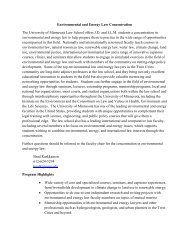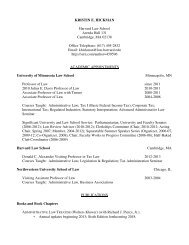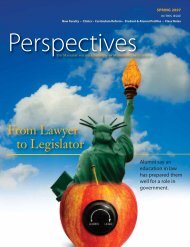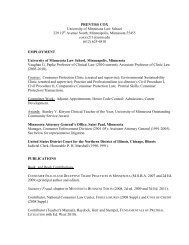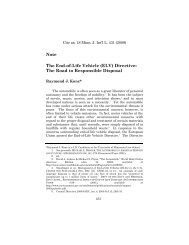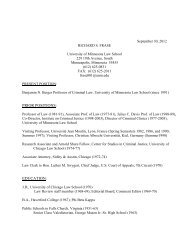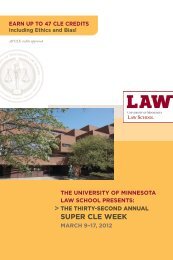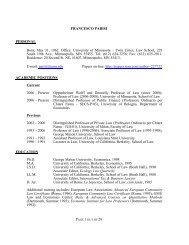Enabling Private Ordering - the University of Minnesota Law School
Enabling Private Ordering - the University of Minnesota Law School
Enabling Private Ordering - the University of Minnesota Law School
Create successful ePaper yourself
Turn your PDF publications into a flip-book with our unique Google optimized e-Paper software.
2009] UMBRELLA CLAUSES 81<br />
<strong>the</strong> people, and is paramount to any rights under contracts<br />
between individuals” and engaged in a balancing process <strong>of</strong> <strong>the</strong><br />
competing rights and interests. 224 Although <strong>the</strong> case concerned<br />
contracts between private parties, <strong>the</strong> Court in Blaisdell already<br />
implied that its reasoning applied to “all contracts, whe<strong>the</strong>r<br />
made between States and individuals, or between individuals<br />
only.” 225 Subsequently, <strong>the</strong> Court expressly extended <strong>the</strong><br />
principle to contracts between States and individuals. 226<br />
The jurisprudence <strong>of</strong> international courts and tribunals as<br />
well as <strong>the</strong> situation under several domestic legal systems thus<br />
gives broad support to <strong>the</strong> conclusion that it is a general<br />
principle <strong>of</strong> law that a State has <strong>the</strong> power to modify or even<br />
terminate contracts with private parties in view <strong>of</strong> a<br />
superseding public interest. It is, however, equally recognized<br />
that <strong>the</strong> State has, in principle, to compensate <strong>the</strong> private<br />
individual for damages incurred by such modification or<br />
termination depending on how significantly <strong>the</strong> contractual<br />
equilibrium is affected. This power <strong>of</strong> States is, in fact, so well<br />
recognized that it has to be read as an implied exception to <strong>the</strong><br />
application and operation <strong>of</strong> umbrella clauses.<br />
3. Contract Regulation, Contract Termination, and<br />
Opportunistic Behavior<br />
An implicit police power exception to <strong>the</strong> operation <strong>of</strong> <strong>the</strong><br />
umbrella clause for <strong>the</strong> regulation <strong>of</strong> contracts in <strong>the</strong> public<br />
interest can not only be justified by having recourse to <strong>the</strong><br />
State’s duty to attend to <strong>the</strong> public interest and to protect rights<br />
and interests <strong>of</strong> third parties. The police power exception can<br />
also be justified in economic terms. In many cases, interferences<br />
with investor-State contracts based on subsequent regulation<br />
concern externalities, i.e. effects on unrelated third parties,<br />
which result from <strong>the</strong> behavior <strong>of</strong> <strong>the</strong> investor. Externalities<br />
come into existence because <strong>the</strong> parties to <strong>the</strong> contract do not<br />
assume <strong>the</strong> full costs <strong>of</strong> <strong>the</strong>ir behavior and <strong>the</strong>refore act, from<br />
an economic perspective, inefficiently. 227 Regulations <strong>of</strong> <strong>the</strong><br />
224. Blaisdell, 290 U.S. at 437 (1934) (quoting Manigault v. Springs, 199 U.S.<br />
473, 480 (1905)).<br />
225. Blaisdell, 290 U.S. at 435 (quoting Long Island Water Supply Co. v.<br />
Brooklyn, 166 U.S. 685, 692 (1896)).<br />
226. United States Trust Co. v. New Jersey, 431 U.S. 1, 14 (1977); City <strong>of</strong> El<br />
Paso v. Geenberry Simmons, 379 U.S. 497, 506−09 (1965).<br />
227. Lewis A. Kornhauser, An Introduction to <strong>the</strong> Economic Analysis <strong>of</strong> Contract<br />
Remedies, 57 U. Colo. L. Rev. 683, 705 (1986).



